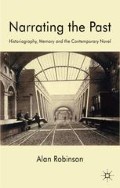Abstract
Much attention has recently been devoted to how nations as imagined communities forge their identity through a consensual ‘national story’.1 Focusing on the relationship between the individual and society — in Rushdie’s words, ‘How […] may the career of a single individual be said to impinge on the fate of a nation?’ — this chapter examines national stories by Salman Rushdie, Rohinton Mistry and Jonathan Coe, in which families serve as a microcosm of the nation.2 Despite their geographical diversity, they display considerable similarities. From a middle-class, left-leaning perspective, all emplot the breakdown of the post-Independence or postwar socialist consensus, enshrined in Nehruvian secularism or the British Welfare State, into communal (that is, sectarian) or class polarisation, significant responsibility for which is attributed to Indira Gandhi or Margaret Thatcher. In varieties of conspiracy theory, their regimes are represented as enmeshed with other power groups — the Shiv Sena and underworld of Bombay, the British establishment — to form all-encompassing networks which inspire depressive resignation among the disempowered or newly marginalised. Significantly, none of the novels envisages organised resistance to these developments; their political protest assumes satirical form. But although their location of agency within the individual rather than in larger social structures has attracted Marxist criticism, this focus enables them to investigate moral responsibility, in the form of complicity with the developments they abhor, and, in Rushdie’s and Mistry’s case, to suggest that societal change is only possible through a transformation of the self, affecting the interactions on a micro scale through which society is (re)produced.
Access this chapter
Tax calculation will be finalised at checkout
Purchases are for personal use only
Preview
Unable to display preview. Download preview PDF.
Notes
Salman Rushdie, Midnight’s Children [1981] (1982), 238. Hereafter cited in the text.
Tabish Khair, Babu Fictions: Alienation in Contemporary Indian English Novels (New Delhi, 2001), ix. Timothy Brennan’s placing of Rushdie as a ‘Third-World cosmopolitan author’ in Salman Rushdie and the Third World (Houndmills, 1989), Ch. 4, was less alert to the specifically Indian context.
Ranajit Guha, ‘On Some Aspects of the Historiography of Colonial India’, in Selected Subaltern Studies, ed. Ranajit Guha and Gayatri Chakravorty Spivak (New York, 1988), 37. On Saleem and Nehru, compare Nicole Weickgenannt Thiara, Salman Rushdie and Indian Historiography (Houndmills, 2009), 26–38, 53–4.
M. Keith Booker, ‘Midnight’s Children, History, and Complexity: Reading Rushdie after the Cold War’, in Critical Essays on Salman Rushdie, ed. M. Keith Booker (New York, 1999 ), 294.
See Sujata Patel, ‘Bombay and Mumbai: Identities, Politics, and Populism’, in Bombay and Mumbai: The City in Transition, ed. Sujata Patel and Jim Masselos (New Delhi, 2003), 3–30.
On addressivity, see C Trivedi, ‘Salman the Funtoosh: Magic Bilingualism in Midnight’s Children’, in Rushdie’s Midnight’s Children: A Book of Readings, ed. Meenakshi Mukherjee (Delhi, 1999), 69–94.
David Lipscomb, ‘Caught in a Strange Middle Ground: Contesting History in Salman Rushdie’s Midnight’s Children’, Diaspora, 1 (1991) 163–89.
Patrick Colm Hogan, ‘Midnight’s Children: Kashmir and the Politics of Identity’, Twentieth-Century Literature, 47 (2001) 510–44; 538.
Benedict Anderson, Imagined Communities: Reflections on the Origin and Spread of Nationalism (1983)
awaharlal Nehru, The Discovery of India (Bombay, 1961), 515.
Salman Rushdie, The Moor’s Last Sigh (hereafter MLS) [1995] (1996), 376. Com - pare Weickgenannt Thiara, Salman Rushdie and Indian Historiography, Ch. 5.
Rohinton Mistry, A Fine Balance [1995] (2006); hereafter cited in the text.
Rohinton Mistry, Such a Long Journey [1991] (1992), 9–11, 39, 68–9, 270–2, 277–81; Bilimoria is based on the Nagarwala case.
Peter Morey, Rohinton Mistry (Manchester, 2004), 166.
Thomas Hardy, Jude the Obscure [1896], ed. Terry Eagleton and P.N. Furbank (1974), 356.
Compare B.S. Johnson, Introduction to Aren’t You Rather Young to be Writing Your Memoirs? (1973), in The Novel Today, ed. Malcolm Bradbury (Glasgow, 1977), 151–3; Jonathan Coe, Like a Fiery Elephant: The Story of B.S. Johnson (2004).
B.S. Johnson, Christie Malry’s Own Double-Entry [1973] (Harmondsworth, 1984 ), 27, 165.
B.S. Johnson, House Mother Normal [1971] (Newcastle upon Tyne, 1984), 204.
Colin Hutchinson, Reaganism, Thatcherism and the Social Novel (Houndmills, 2008), 8, 53.
Copyright information
© 2011 Alan David Robinson
About this chapter
Cite this chapter
Robinson, A. (2011). National Stories. In: Narrating the Past. Palgrave Macmillan, London. https://doi.org/10.1057/9780230316744_4
Download citation
DOI: https://doi.org/10.1057/9780230316744_4
Publisher Name: Palgrave Macmillan, London
Print ISBN: 978-1-349-31413-3
Online ISBN: 978-0-230-31674-4
eBook Packages: Palgrave Literature CollectionLiterature, Cultural and Media Studies (R0)

